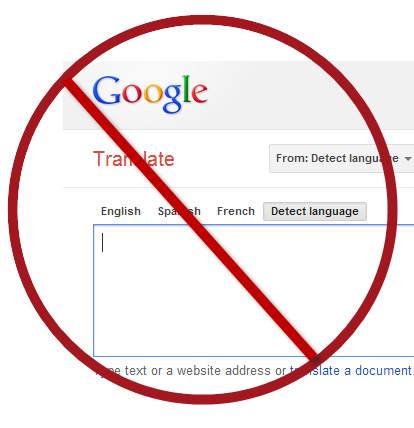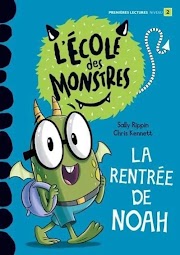Word Reference vs Google Translate
Do you let your students use an online translator, such as Google Translate, Reverso, or if you've been teaching as long as I have - do you remember what was once the leader of the pack, Bablefish? I don't. EVER. And I feel very strongly about this, in case you couldn't tell.
Some teachers that I work fairly closely with disagree with me on this point, and it irks me that students are excited to come visit me to proudly proclaim that another teacher gave them an A (or level 4) for a project that (s)he knew was done with a translator. How does that demonstarte learning in a langage class?
The dictionary that I recommend to my students is Word Reference. But essentially I tell them if they see the word "TRANSLATE" anywhere on the web page, it's probably not a resource they ought to be using!
If your opinion is similar, check out the signs I post in my classroom to remind students and to reinforce this. It's important to make sure your expectations are clear!
The dictionary that I recommend to my students is Word Reference. But essentially I tell them if they see the word "TRANSLATE" anywhere on the web page, it's probably not a resource they ought to be using!
Why WordReference?
Aside from the ability to look up a word in French to find its English equivalent(s) and vice versa, there's a whole other aspect to WordReference that I just ADORE! At the bottom of any definition page, there are links that will show where in the forum the word you are searching has been discussed in a variety of settings.
I don't routinely show it to my Core French students, but I introduce it to some that really strive to learn (you know, that child who somehow missed out on the chance to register in Immersion, or developed an interest not driven by their family later in life). I've also been know to introduce it on the sly to the student who will turn to a translator to express themselves, despite my warnings, no matter what. For Intermediate immersion students - it's a must have!
I don't routinely show it to my Core French students, but I introduce it to some that really strive to learn (you know, that child who somehow missed out on the chance to register in Immersion, or developed an interest not driven by their family later in life). I've also been know to introduce it on the sly to the student who will turn to a translator to express themselves, despite my warnings, no matter what. For Intermediate immersion students - it's a must have!
How does it work?
The 'forum decorum' is that someone posing a question related to a particular usage has to try a translation themselves, and then others will pitch in to help them. I love that, because you know how I feel about collaboration in learning... I'm all for help, but love it when people are willing to try on their own, or to say "This is what I've got so far..." My goal is to leave them with some life-long skills for using their second language, even if it isn't perfect.
It's important to teach them how to use the forum links at the bottom of the page when they're looking up a word, for compound nouns as well as discussions. Too often, they look only for the first definition or two and stop there... students need modeling and opportunities to practice skimming the resource for the best match in the context they have.
I tell my French language learners that they need to search for a single word in a dictionary, and if it's part of a compound form or expression, to look below the standard definitions for that information. This is typically true in paper dictionaries as well.
It's important to teach them how to use the forum links at the bottom of the page when they're looking up a word, for compound nouns as well as discussions. Too often, they look only for the first definition or two and stop there... students need modeling and opportunities to practice skimming the resource for the best match in the context they have.
I tell my French language learners that they need to search for a single word in a dictionary, and if it's part of a compound form or expression, to look below the standard definitions for that information. This is typically true in paper dictionaries as well.











